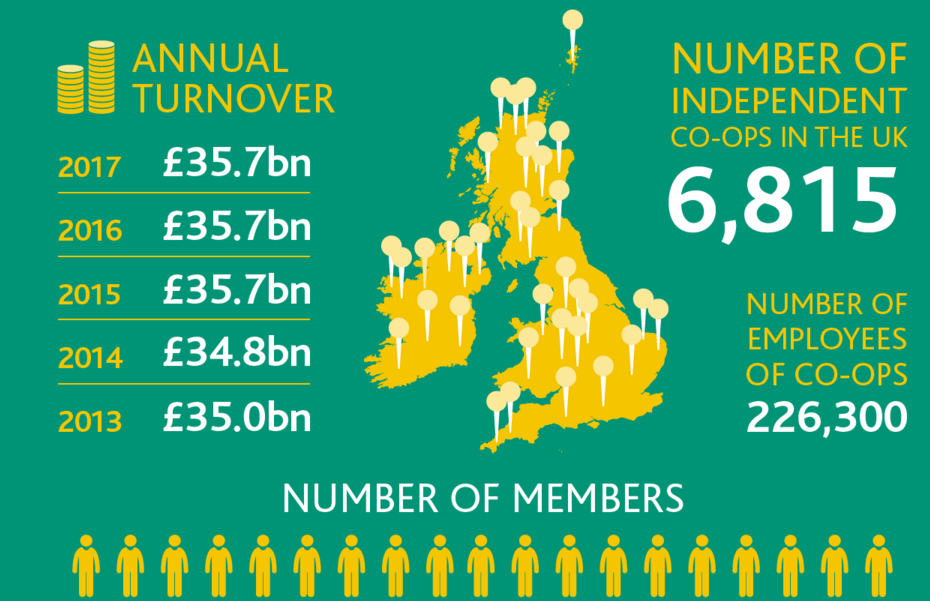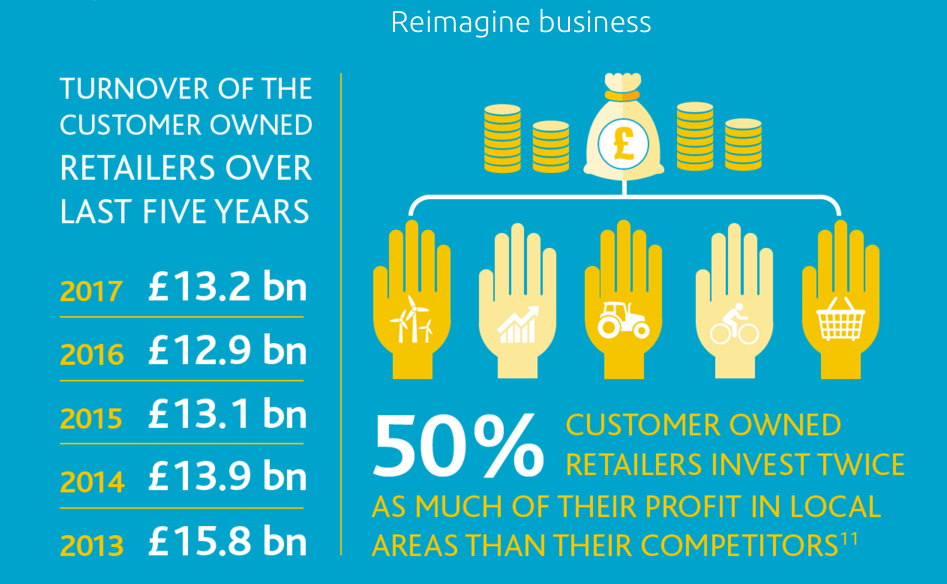Co-operatives have shown resilience over the past year, according to the annual report into the sector.
The annual state of the sector report, from sector body Co-operatives UK, reveals that the UK’s co-operative economy has a collective turnover of £35.7bn, which is the same as previous years.
The sector includes 13.6 million active members and 226,000 employees. Over 700,000 new members joined co-ops last year, the rise is driven by a 600,000 membership increase at the Co-op Group, the UK’s largest customer-owned business. The largest co-operative on the list is the employee-owned John Lewis Partnership with a turnover of £10bn. The Co-op Group comes second with £9.47bn, followed by Arla Foods (£2.15bn), National Merchant Buying Society Limited (£1.39bn) and the Midcounties Co-operative (£979m).

Commenting on the results, Ed Mayo, secretary general of Co-operatives UK, said: “Underlying the political shocks the country has experienced over the last year is a call from many parts of the UK population for an economy over which they have more of a say and from which they get a fair share.
“As organisations owned by 13.6 million people, the UK’s 7,000 co-ops give people a say in what they do and how their profits are used. They offer a practical way to reimagine an economy in which people have more control over their homes, work and local areas.
“It’s no surprise we’re seeing a spike in interest in co-ops, whether it’s social care providers finding that a co-operative approach can give its users and workers a voice, or young designers and web developers seeing co-ops as a natural way to collaborate at work.”
The top 20 co-ops
[table id=25 /]
The co-operative retail sector has also shown strong results, with a total turnover of £25bn last year, an increase of £580 million or 2.5% from the previous year. The report points out that 50% of the customer owned retailers investing twice as much of their profit in local areas compared to their competitors.

Commenting on the report, Steve Murrells, chief executive of the Co-op Group, said: “It’s testament to the strength and relevance of the co-operative model that we see such a positive report on our sector, especially when set against the background of a climate of economic and political uncertainty.
“The Co-op difference is something we know our members increasingly see as being relevant, both in their communities and to themselves, but also in addressing issues that our country faces today, such as Modern Slavery and loneliness and isolation. Co-ops are about making society a better place to be. That’s been our role since we were founded, and it’s our responsibility to carry that forward for the co-operators of tomorrow.”
In the freelance sector, over 118,000 workers and freelancers are members of co-ops. According to the report, more and more young people are also considering co-op models in creative industries. Last year saw a 28% increase in the number of start-ups among digital and arts organisations, accounting for just over 10% of all co-op start-ups over the year.
Overall, worker co-ops had a turnover of £10.7bn, an increase of £0.2bn from the previous year.
Farming is the second largest industry in the co-operative economy. Last year the country’s 436 farming co-ops, which are owned by 152,000 farmers turned over £7.4bn, a decrease from last year’s £7.8bn. Co-ops UK’s report also identifies ways in which farmer co-ops are adding value to their members’ products, with dairy co-ops like Arla and the Organic Milk Suppliers Co-operative developing new products and brands, and exporting to international markets.
Tomas Pietrangeli, managing director of Arla Foods UK, the largest farmer-owned co-operative in the country, said: “Despite a tough year, organisations like Arla are working hard to innovate and ensure a positive return for their owners. In our case, this has meant developing a portfolio of new and exciting dairy products, including vitamin-boosted milk and skimmed milk that tastes like semi-skimmed.
“While we are doing what we can to weather some challenging times, we also look to government to support our sector – and other co-operatives – in its Brexit negotiation and eventual transitional agreements, to provide continuity across trade, labour and food regulation in particular. This way, we will be better-placed to take advantage of the opportunities of Brexit to the benefit of our farmer owners.”
The total turnover of UK co-ops for 2016 has been amended from £34bn to £35.7bn after Co-operatives UK received additional data from other co-operatives. This year’s report is also reporting the number of active members in co-ops, rather than the total number of members, used in previous reports.
• Read the full results online: reports.uk.coop/economy2017